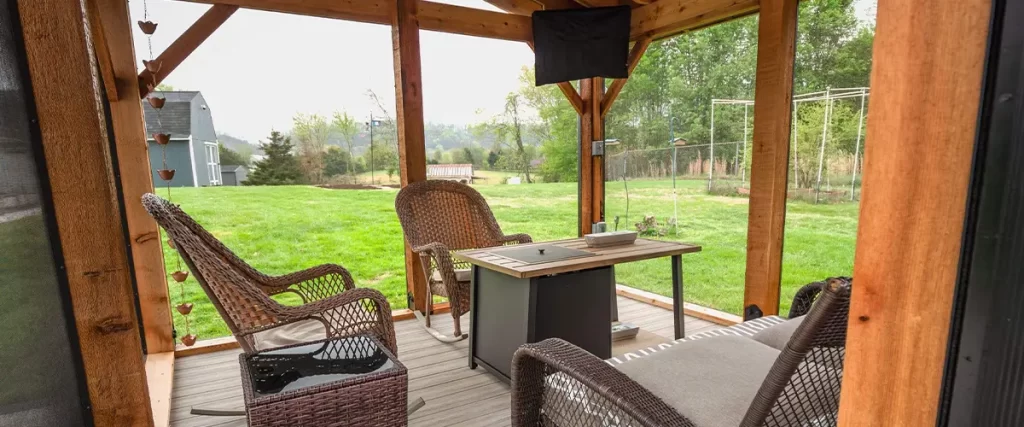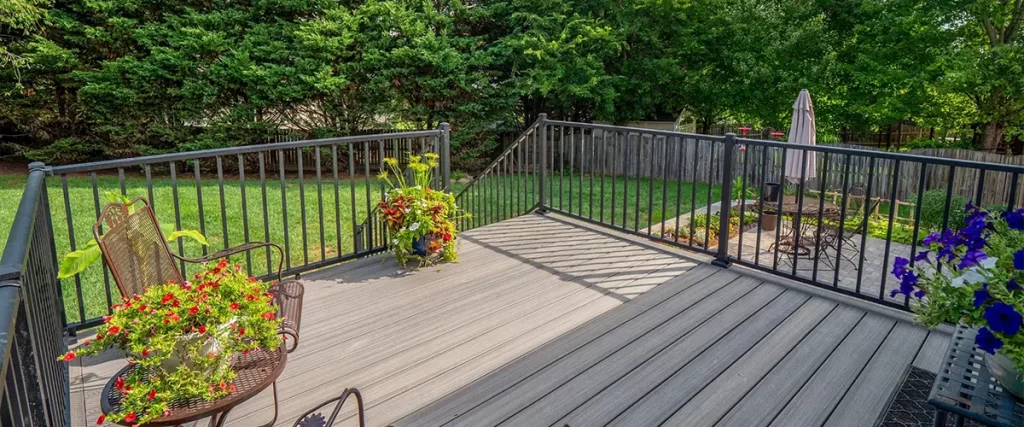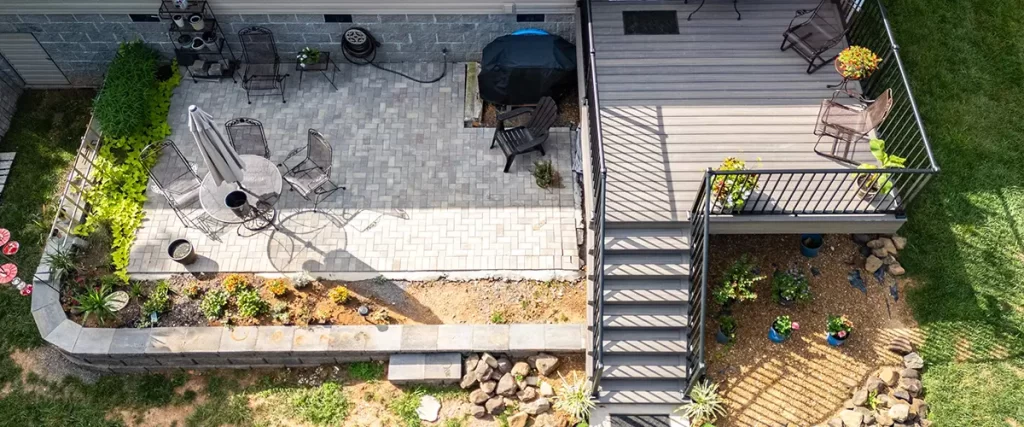If you’ve lived through a spring or summer in Knoxville, you already know the story—yellow-green pollen dust coating your car, thick humidity hanging in the air, and your backyard deck looking rougher than you’d like. You’re not alone.
For Knoxville homeowners, dealing with pollen and high humidity is just part of life. But if you’ve ever wondered what that combo is doing to your deck, and what you can do to fight back, you’re in the right place.
In this post, we’re diving deep into how Knoxville’s unique climate affects deck maintenance. We’re not just skimming the surface—we’ll walk you through the science, the local conditions, the real effects on wood and composite materials, and (most importantly) what you can do to protect your investment and enjoy your outdoor space stress-free.

Why Knoxville’s Climate Is Tough on Decks
Knoxville sits in USDA Hardiness Zone 7a and falls squarely within a humid subtropical climate. That means hot, sticky summers and plenty of rainfall—averaging around 48 inches annually, according to the National Weather Service. Add in tree pollen that arrives as early as late February and lingers through May, and you’ve got a recipe for deck wear-and-tear that’s both sneaky and aggressive.
Let’s break that down.
What Pollen Does to Your Deck
Pollen isn’t just an allergy nightmare—it’s also a deck maintenance headache.
- Staining: When mixed with rain or morning dew, pollen turns into a sticky residue that clings to deck surfaces, staining wood and even affecting composite finishes.
- Promotes Mold and Mildew: Pollen is organic matter. When it’s trapped in humid conditions, it becomes a buffet for mold and mildew.
- Reduces Traction: On composite decking especially, wet pollen can create a slick surface, making your deck unsafe.
- Clogs Gaps: Pollen can settle into the cracks and joints of your decking boards, retaining moisture and accelerating rot in wood decks.
How Humidity Compounds the Problem
Now layer in East Tennessee’s summer humidity, which regularly spikes above 75%, and you’ve got long-lasting moisture retention on every surface.
- Wood Swelling and Warping: Natural wood soaks up moisture, leading to warping, cupping, or splitting.
Accelerated Decay: Humidity keeps decks wetter for longer, which promotes rot and decay—especially if your deck isn’t sealed properly. - Paint & Stain Breakdown: Excessive humidity breaks down sealants and stains faster, reducing the protection your deck needs.
- Metal Hardware Corrosion: Hidden deck fasteners, joist hangers, and other connectors are at risk of rust when moisture lingers.
How to Protect Your Deck from Knoxville’s Pollen and Humidity
You don’t need to surrender to Mother Nature. With a smart, proactive maintenance routine, you can keep your deck beautiful and safe year-round.
1. Frequent Cleaning During Peak Pollen Season
Don’t wait until pollen builds up—frequent light cleaning is far more effective.
- Rinse weekly with a garden hose or blower during pollen season (late Feb to late May).
- Use a soft-bristle broom to sweep dry pollen.
- Avoid pressure washing unless absolutely necessary—it can damage wood fibers.
2. Choose the Right Sealants and Stains
In Knoxville’s humid climate, not all sealants are created equal. You need one that resists both UV and water.
- Use water-repellent sealers with mold/mildew inhibitors.
- Reapply every 1-2 years, especially after heavy pollen seasons or a particularly wet summer.
- Look for oil-based stains for deeper penetration and moisture protection.
3. Keep Deck Ventilation in Mind
If your deck skirting blocks airflow underneath, humidity gets trapped—leading to a moist, moldy underside.
- Install vented lattice or keep skirting panels spaced.
- Trim back vegetation around the deck perimeter to promote airflow.
4. Install a Gutter or Drainage System
Prevent rainwater from cascading off your roof onto your deck. A gutter system can reduce standing water and protect both your deck surface and footings.
5. Schedule Seasonal Inspections
Catch problems early before they turn into structural issues. Signs to watch for:
- Soft spots or springy boards
- Dark stains around joints or fasteners
- Rusting hardware
- Musty smells indicating mildew

Best Materials for Knoxville Decks
Not all decking materials hold up equally against pollen and humidity. Here’s how the most common ones fare:
Pressure-Treated Wood
- Pros: Affordable, widely available, classic look.
- Cons: Requires more frequent sealing; prone to warping and mold if not maintained well.
Cedar or Redwood
- Pros: Naturally resistant to decay and insects.
- Cons: Softer woods that still absorb moisture; need careful upkeep in high humidity.
Composite Decking
- Pros: Low maintenance, mold- and moisture-resistant, doesn’t warp or splinter.
- Cons: Can still get slick with pollen; needs regular cleaning.
Best Decking Manufacturers for Knoxville Homes
Durable, weather-resistant materials from these manufacturers can better withstand pollen, moisture, and humidity.
Top Brands:
- Trex: A leader in composite decking with anti-slip finishes and moisture-resistant cores.
- Fiberon: Known for eco-friendly composite decks with built-in mold and mildew resistance.
- TimberTech: Offers capped composite decking that resists water absorption and staining.
- Deckorators: Durable and stylish options with mineral-based composite cores perfect for humid climates.
- AZEK (by TimberTech): 100% PVC decking with industry-leading protection against moisture and fading.
FAQ: Homeowner Questions About Pollen & Humidity’s Impact on Decks
How often should I clean my deck during pollen season?
Aim for once per week, or more frequently if pollen levels are high. Consistency is key.
Is composite decking completely immune to humidity damage?
No, but it is highly resistant compared to wood. It won’t rot or warp, but it still requires cleaning.
What’s the best time of year to reseal my deck in Knoxville?
Late spring or early fall, when temperatures are mild and humidity is lower, is ideal for applying sealants.
Can pollen really cause mold growth on my deck?
Yes—pollen is organic material, and in high humidity, it becomes the perfect breeding ground for mold and mildew.
Is it worth switching from wood to composite decking?
If low maintenance and longevity matter to you, composite is a strong long-term investment, especially in humid climates like Knoxville.

Call to Action: Let Riverview Decks Help You Beat the Elements
Your deck should be a relaxing retreat, not a seasonal headache. At Riverview Decks, we specialize in creating and maintaining outdoor spaces that can stand up to Knoxville’s unique climate. Whether you need expert maintenance advice, a full resurfacing, or a completely new deck built with climate-resistant materials, we’re here to help.
Contact us at (865) 801-4545 today and take the first step toward a more durable, beautiful deck—built to handle whatever East Tennessee throws at it.

